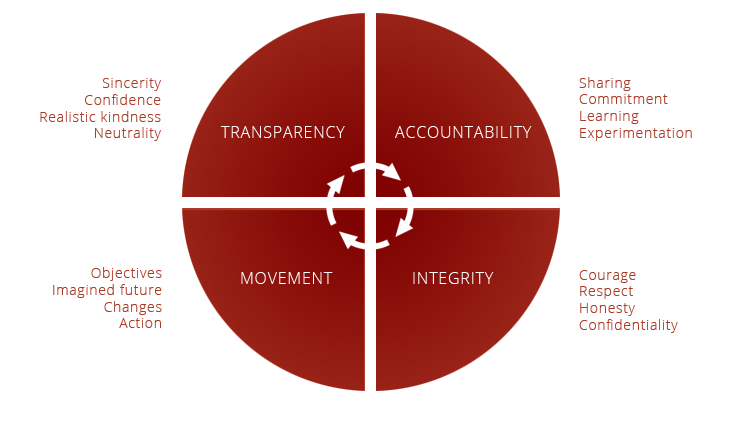Values and Principles
My Values
Whatever my actions, my approach is based on a great listening and an analysis of needs expressed and not expressed by my clients as well as developing a relationship based on trust, respect and sincerity. I apply an ontological approach to organizational challenges, always looking to put people at the center of my advice or coaching approaches. Indeed, I firmly believe that each person has development potential often underutilized.

Transparency Principle
The truth must be at the heart of the relationship between the coach and the coachee. This implies that the coachee is sincere and that he opens up during the coaching sessions, even if this pushes him out his comfort zone. This principle also implies that the coach is the guarantor of a climate of trust and realistic goodwill, specifically by ensuring neutrality of judgment and ability to say speak the truth during coaching sessions.
This climate aims to create an environment conducive to confidence and to action.
Accountability Principle
The coaching partnership implies a shared responsibility. The coach must guide and direct the coachee on the best way for him to achieve his objectives. The coachee, meanwhile, agrees to voluntarily do something new or different.
Thus, the coachee has to express a sincere desire to get out of his comfort zone by initiating a process of transformation, learning and experimentation with new ways of doing and new behaviors.
Movement Principle
Coaching loses effectiveness if it does not translate into changes and concrete results. To do this, the coaching process must clarify precisely the objectives that the coachee wants to achieve. This clarification should be done from the perspective of viewing an imagined future, positively connected to a concrete action plan for the coachee to be put into action.
Thus, the setting in motion of the coachee and the monitoring of his progress is a strong principle of a successful coaching process. Indeed, if awareness can be part of the results of a coaching process, it goes without saying that translating this awareness into tangible change is part of the expected objectives of an effective coaching process.
Integrity Principle
For the coach, integrity lies on his ability and courage to accept its limits. He must refuse the mandates for which he has doubts about his ability to help the coachee. This principle also implies that the coach is able to terminate a coaching that does not meet the original objectives and for which he would have tried all possible ways to return the coaching to the right direction.
For the coachee following this principle means to respect the commitments he has made to himself. Facing implementation difficulties, he needs to speak with his coach in a transparent manner as expressed by the first principle.
Unless specific agreement between the coach and the coachee, the principle of integrity also implies a total confidentiality about discussions and the work done during the coaching.

